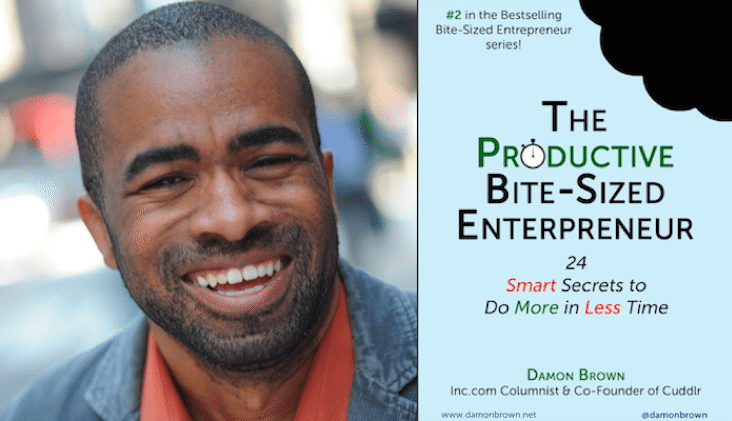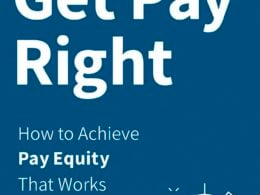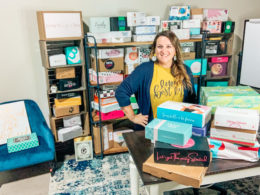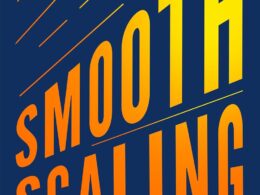When I wrote “The Bite-Sized Entrepreneur: 21 Ways to Ignite Your Passion & Pursue Your Side Hustle,” my intention was to arm you with everything you needed to find and trust your passion, and use that direction to create your ultimate side hustle. My own experience co-founding and selling my startup, Cuddlr, while raising my baby taught me that you can make your entrepreneurial mark without sacrificing your life.
If the first book laid the foundation to ignite your passion, “The Productive Bite-Sized Entrepreneur” is here to help you sustain it. After all, once you make room in your life and grow into your successful side hustle, then your main focus has to be on maintaining and strengthening your business. Your business is always a reflection of yourself. This book will make you a more productive version of yourself.
Perhaps the smartest decision you can make as an entrepreneur is to focus less on the competition and more on presenting yourself so that customers won’t even think about working with anyone else. After all, the key to productivity is focus, and your most important focus should be on staying true to your brand, not worrying about someone else’s.
Below, find an excerpt of the latest book in “The-Bite Sized Entrepreneur” series, selected exclusively for StartupNation readers. The excerpt comes from Chapter 23 of the book, titled “Bulletproof.”
The more you know yourself, the more space you have to be productive
Pressure to be productive can actually stress us out to the point where we are no longer potent, and it usually comes from two places: internal and external. The internal pressure reminds you that there is a particular, often idealized goal you planned to reach and you will absolutely not reach it if you do not hit a certain level of productivity. The external pressure tells you that other people will judge you or, worse, stop you from reaching the goal if you aren’t being productive fast enough.
The internal pressure can be relieved by setting realistic milestones, creating limitations to encourage focus, and maintaining your self-care. The external pressure is much more nefarious. It is the competitor that you know now, or perhaps the unknown competitor in the near future that can snuff you out at any time. It is the loved one that, whether he said anything or not, you know is just waiting for you to fail so he can be proven right. It is the loyal customers who you think will be disappointed if you do not deliver as quickly as you would like. It is the invisible “they.” And, to use a popular sports saying, “They cannot be stopped, only contained.”
Also on StartupNation.com: The Third Wave by Steve Case [Book Excerpt]
Containing the external pressure can be done in one simple way: Understand what you are not. By knowing what you are not, you have little to worry about with other people derailing or duplicating your success. A good example is the ride-sharing services Lyft and Uber. On paper, they sound like similar companies, both employing everyday drivers to turn their own vehicles into ad hoc taxis. The identities couldn’t be more different, though: Uber pushes the remote, cool personal limo feel, as it originally only utilized black cars, while Lyft represents the fun, collegiate experience, with its cars initially having big pink moustaches stuck on their bumpers. Talk about branding! I know many creatives that hate the word “branding,” but that’s what you are doing when you say you only work with small organizations, or your boutique caters to the working class, or your startup was created for hungry millennials, and so on. It is what separates you from them. And separating yourself is a hell of a lot easier when it comes from your own identity, as you don’t have to work so hard to be authentic. I heard Uber co-founder Travis Kalanick speak at TED and there is no way you could see him and believe he created Lyft. The Uber brand is a representation of him, through and through. You nor I could recreate Uber, even with a billion dollars. Uber belongs only to Travis. People can compete, but they cannot replicate.
Identifying what you are not, and therefore quieting the external pressure, is important for two reasons. First, putting the focus on proving something to the outside world is a ridiculous task: If you are doing anything worthwhile, then there will be critics, and those critics will never be silenced. It is a waste of precious time. Second, worrying about the external pressure will take you out of your own natural productive cycle. Get in the wrong headspace and you could be shipping products to please the public when your work actually needed more time to gestate, or taking on more duties to hush critics when you should be better managing your tasks at hand. Again, you have an instinct for when you should be pursuing, when you should be doing, and when you should be renewing. Not having a rock-solid identity could have you dramatically trying to force productivity based on the fickle public.
Master marketer Seth Godin explains it further:
“At some point, you need to decide who you are. You need to understand the scale of what you built. You need to decide what the brand is when people hire you and when they engage with you… [and] we can’t jump to the next thing instantly nor can we complain that picking one scale keeps us from doing the other thing. We have to embrace it. The fact is that it helps us that we have a sinecure, that we have a niche, that we have a thing that we do, ‘cuz then, when other people want to be in our space just for kicks, they can’t! They are not us at our scale with our contribution to make.”
The more you clarify what you are not, the more bulletproof you become. Then you can take your time, follow your own productivity cycle, and push away worries about being replaced – because you can’t be.






